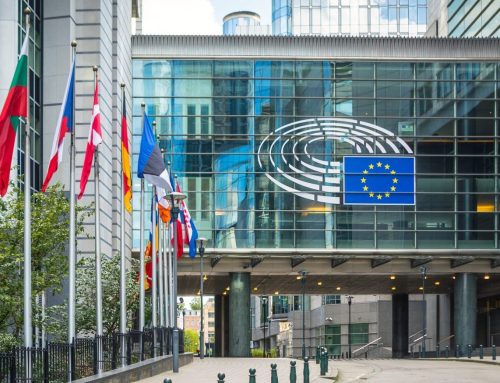Russia
Monitored Russian accounts last week tweeted 16,366 times, generating 161,117 retweets and 518,932 likes.
Kremlin-affiliated accounts last week claimed that Ukraine and its “US handlers” were preparing to frame Moscow for an attack on the Russian-occupied Zaporizhzhia nuclear power station, which Russia’s Defense Ministry warned would spread radioactive material over much of Europe. Last Thursday, state-funded media asserted that Kyiv planned to attack the nuclear plant as the UN secretary general visited. Russia’s UK Embassy said that Ukraine’s army had stationed up to 1,000 servicemen near the plant, who were equipped with “special protective kits, radiation reconnaissance, and control gear.” Other diplomatic accounts insisted that “the Ukrainian military must be forced to stop bombing” the station and attempted to present Russia as an innocent party that was prepared to work with international inspectors. Russia’s Mission to the UN tweeted images of documents, which said both that Ukraine was preparing the provocation and that the United States was “keeping silent” about the threat, “thereby encouraging impunity” for Kyiv and “contributing to a possible nuclear catastrophe.” The documents said the goal of the attack was to create an exclusive zone around the plant, to bring international forces into Ukraine, and to accuse Russia of “nuclear terrorism.” To hammer home claims of US involvement, diplomatic and state media accounts shared images of weapons made by the US firm EaglePitcher Technologies, which they said were used to target the Zaporizhzhia plant. Nikolai Patrushev, the secretary of Russia’s Security Council, also claimed that the United Kingdom would bear responsibility for a nuclear incident. Other accounts said the EU was turning “a blind eye” to and “blatantly lying” about the nuclear threat that Ukraine posed to Europe.
Russian propagandists also said Ukraine was behind the assassination of Daria Dugina—the daughter of the influential Russian ultranationalist Alexander Dugin, whom some in the West have called “Putin’s brain.” A car bomb in a Moscow suburb killed Dugina after she left a festival where father spoke. Dugin reportedly planned to leave in the same car as his daughter but changed plans. On Monday, RIA Novosti ran the headline, “FSB solved the murder of Daria Dugina.” Russian intelligence claimed that Ukrainian special services prepared the attack and accused an agent named Natalya Vovka of carrying it out. Vovka moved into Dugina’s apartment building in July, planted the car bomb at the festival, detonated the device remotely, and then fled to Estonia, according to Russian state media, which also asserted that Vovka was part of the Azov Battalion, a group that is regularly maligned by Russian propagandists for its ties to neo-Nazism. Kremlin-linked accounts said the incident amounted to “state terrorism” and warned that “Ukraine has declared terror against Russian intellectuals.” Others showcased Daria’s work, including her claims that “the globalist moment is over, the end of liberalism has come.”
Kremlin-linked accounts likewise circulated the Defense Ministry’s statement that Ukraine had used chemical weapons again Russian soldiers and civilians. The ministry said that Kyiv turned to “chemical terrorism” after suffering a string of defeats and noted that Russian officials would be presenting evidence of the war crime to the Organization for the Prohibition of Chemical Weapons (OPCW).
Moscow-affiliated accounts also criticized a range of actions by EU states and highlighted the bloc’s economic issues. State media and diplomats railed against a series of European countries who put in place visa restrictions for Russian nationals, calling those measures “pure racism and Nazism.” They also protested Estonia’s move to dismantle Soviet-era monuments, but there wasn’t a single Kremlin-linked tweet about Estonia’s claim that it had repelled a Russian cyberattack that came shortly after the monuments were taken down. Meanwhile, state media highlighted issues with gas prices and inflation across the West, and they complained about the West’s “totalitarian propaganda.” They also claimed that the West was moving away from Ukrainian President Volodymyr Zelensky.
China
Monitored Chinese accounts tweeted 18,825 times last week, pulling in 132,766 retweets and 520,451 likes.
While Chinese diplomats and state media continued to shift their messaging away from Taiwan and on to other topics, the island remained a major topic in their social media posts last week. “Pelosi” dropped out of the top ten most frequent key phrases and hashtags in tweets from Chinese accounts monitored on Hamilton 2.0; however, the US speaker of the House continued to be mentioned in many of the Taiwan-related tweets that generated most engagement last week. Chinese Ministry of Foreign Affairs (MFA) spokesperson Zhao Lijian called her visit “US hypocrisy at its best,” Xinhua wrote that the trip constitutes interference in China’s internal affairs, and China Daily accused her of “tak[ing] advantage of the political mess at home.”
Russian President Vladimir Putin poured oil on the fire by stating that the visit was “a thoroughly planned provocation.” He compared US actions in the Pacific to NATO’s supposed encirclement of Russia. His statement was repeated in Wednesday’s Chinese MFA press conference, as well as by several Chinese diplomatic and state media accounts.
With Taiwan-related coverage falling throughout last week, Chinese diplomats and state media shifted their attention elsewhere. They defended Chinese policies in Xinjiang, criticized the United States, and zeroed in on Japan’s WWII record.
“Xinjiang” was the fourth most frequent key phrase and hashtag in tweets from Chinese accounts monitored on Hamilton 2.0 last week. The Chinese consul general in Belfast and the former consul general in Beirut generated the highest engagement numbers for Xinjiang-related content by posting the same tweet calling Xinjiang genocide and forced labor claims “fake.” These attacks were accompanied by positive tweets about the region; with Assistant Foreign Minister Hua Chunying tweeted about a beautiful lake there, and the consul general in Karachi praised China’s protection of Uyghur culture.
Another strand of Chinese messaging that generated a lot of engagement last week was criticism of the United States. The most engaged with tweet from an official Chinese account last week was a meme posted by MFA spokesperson Zhao implying that 9/11 was an inside job. Chinese diplomats were particularly active in posting and amplifying content related to the US withdrawal from Afghanistan in the summer of 2021. The MFA said the “Kabul moment” supposedly put an end to US claims to global leadership. MFA spokesperson Zhao Lijian tweeted that the United States had “massacred more than 174,000 people” in the country. The ambassador to ASEAN shared dramatic images from Kabul airport in August 2021, and the consul general in Belfast attacked the US decision to freeze $7 billion of Afghanistan’s assets. Chinese messaging also amplified Pink Floyd founder Roger Waters telling Russian state media that US foreign policy was “so dangerous.”
While criticism of US foreign policy generated the most engagement, Chinese diplomats and state media also attacked the US domestic situation. On Tuesday, the MFA commented at length on systemic racism in the United States. On Sunday, a Pakistan-based diplomat shared a video of a mob looting a 7-Eleven in Los Angeles. And CGTN-affiliate T-House published a comic about the “party game” of separation of powers in the country.
Japan was also consistently singled out in Beijing’s messaging last week. Chinese diplomats and state media converged around the 77th anniversary of Japan’s defeat in WWII on August 15. The commemoration was not conciliatory, with the former ambassador to the United Kingdom calling Japan’s surrender “the victory of justice over evil, light over darkness,” and the People’s Daily singling out the Nanjing Massacre and Unit 731’s biological experiments in Asia. Other state media voices were even harsher, with Global Times tweeting “We will NEVER forget the history” and the head of China Daily in Europe implying that Japan could not be trusted not to “repeat the history.”
Chinese messaging also continued to aim at Global South countries, contrasting China’s generosity with the United States and its allies’ supposed selfishness. In its Monday and Thursday press conferences, the Chinese MFA pushed back against accusations that the Chinese state was saddling developing nations with unsustainable levels of debt and pushed back against reports that those countries are downgrading their level of involvement in Chinese-financed infrastructure projects.
A Chinese decision to cancel 23 loans for 17 African countries coincided with US Secretary of State Anthony Blinken’s visit to several African countries. Many Chinese diplomats used the loan cancellations to distinguish Beijing from Washington. To further demonstrate the supposed convergence of interest between China and the Global South, an MFA official tweeted a video in which Nelson Mandela dismisses a question about the human rights abuses of the leaders of Palestine, Libya, and Cuba before arguing that they are only the United States’ “enemies.”
Beyond Africa, MFA spokesperson Zhao also quoted the President of Nicaragua attacking US imperialism in Latin America and the Caribbean, while the Chinese consul general in Belfast argued that Chinese humanitarian assistance to Ukraine helped the European country more than US weapons.
An outlier in this overall positive messaging aimed at the Global South seemed to be India, as a highly engaged-with CGTN America story announced that “India frees convicted rapists and murderers.”
The views expressed in GMF publications and commentary are the views of the author alone.







